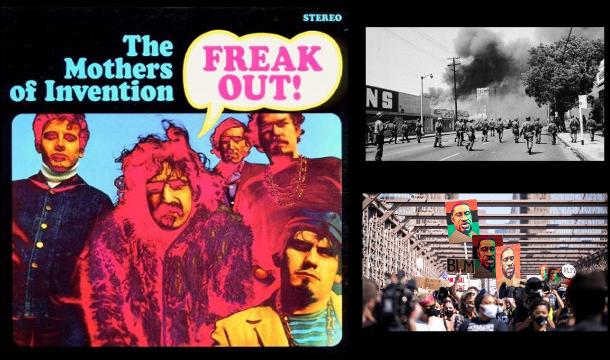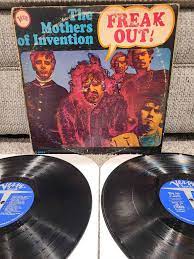Song Analysis Corner: “Trouble Every Day” | Frank Zappa

Hello, your modern-day #eCommerce student of Marshall McLuhan here! We freelance authors have to stay studied up on our media science, which is why we tend to appreciate satire of media, especially showing the business side. Here’s a few movies and TV series of the “satires about the media industry” genre for an example:
- WKRP in Cincinnati
- The Larry Sanders Show
- Murphy Brown
- Network (1976)
- Natural Born Killers (1994)
- The Truman Show (1998)
You get the picture. The modern Internet market is the same wacky disaster zone now as it was then. Indeed, it seems we even know less about media than we did then. The Zombie Apocalypse is over, and the zombies won.

Now take 1966’s media atmosphere. It was the golden age of 24/7 headline news. Round the clock, coverage of havoc and chaos prompted the expression “if it bleeds, it leads.” That’s the kind of TV news coverage Frank Zappa (praise be unto the name of the prophet forever, ahmen) had in mind when he wrote:
“Trouble Every Day”
This song was first released by Frank Zappa and the Mothers of Invention, on the album Freak Out! “Trouble Every Day” was also released as a B-side with the single “Who Are the Brain Police?” , of all things. Written just after the Watts Riots, the song was originally titled “The Watts Riot Song,” but had three main themes:
- racial violence
- social injustice
- sensationalist journalism
The song is of course as relevant today as ever. Still, the US’s national issues have improved a couple Civil Rights laws since the 1970s, but the media situation has now moved to social platforms in the 2020s - and Techenstein’s monster groans awake to snap his chains in the basement.
In typical Zappa fashion, the song has since been re-arranged and re-released on various collections. There’s also a few covers of it out there. Notably, this is the song that got The Mothers signed to MGM Records, whose producer heard only this and judged the whole band to be a “white blues band.”

Was TV Really That Bad in the 1960s?
Speaking as a Gen-Xer, I can confirm, TV news every night was a litany of shootings, stabbings, traffic pileups, all with blood and gore footage. It was the age before seatbelts were enforced; traffic accidents were bloodier, and news cameras just flashed the most gruesome footage they could find right at you at 6PM while you’re munching your tin-tray oven-heated TV dinner – mmmm, that leaked metal contamination just spiced up those faded carrot slices! It was a brutal time.
Now, you modern kids are quite impressed, to understate the point, with the events of January 6th, 2021. As well you should be; but let’s not forget, this is not the most historically torn we’ve seen this country.
First off, the Vietnam War brought tensions to a boil in the 1960s. The decade started with Jim Crow laws, after all. The the Civil Rights Act of 1964 and the Voting Rights Act of 1965 finally brought that to an end, but over a bitter street conflict.
By the end of the decade and into the ‘70s, Nixon got paranoid enough about kids burning their draft card and protesting Vietnam (=“in league with the commies”) to start his own War on Drugs – “can’t target the hippies freedom of speech so let’s just bust them for pot.” Nixon got impeached, Ford stepped in, and not one, but TWO attempts to assassinate Ford failed! Two guns, point blank range.
There were no trigger warnings in media. If the President had a gall bladder surgery scar, he showed it on live camera.

“No One Blabs it Faster!”
Never underestimate a visionary like Zappa. Given the other media parodies I list – and the continuing state of media up to this point – Zappa prophesied a media trend in the 1960s that would continue as a standard: people struggling while the TV news turned a dead, unhelpful eye. “The Revolution Will Not Be Televised” but it doesn’t look like it’s going to be tweeted, either.

 A new era for Millennial favorite, Linkin Park
A new era for Millennial favorite, Linkin Park  Anime to watch for the soundtracks… and other reason...
Anime to watch for the soundtracks… and other reason... .jpg) Dolly, we need you
Dolly, we need you  The Stranger Things Effect: How new media is drawing...
The Stranger Things Effect: How new media is drawing...  The most underrated soundtrack of the early 2000s
The most underrated soundtrack of the early 2000s  Buy the Soundtrack, Skip the Movie: Brainscan (1994)
Buy the Soundtrack, Skip the Movie: Brainscan (1994)  Let’s Go to the Hop - Ignore That Door’s Four Bunnie...
Let’s Go to the Hop - Ignore That Door’s Four Bunnie...  Forgotten Weird Music Videos of the Ancient 80s | vol 3
Forgotten Weird Music Videos of the Ancient 80s | vol 3  Forgotten Weird Music Videos of the Ancient 80s | vol 2
Forgotten Weird Music Videos of the Ancient 80s | vol 2  Forgotten Weird Music Videos of the Ancient 80s | vol 1
Forgotten Weird Music Videos of the Ancient 80s | vol 1  Let’s Chase Taylor Swift Rumors
Let’s Chase Taylor Swift Rumors  When the Beatles Touched Off a Movie War
When the Beatles Touched Off a Movie War  When Mike Bloomfield Composed a Soundtrack For Andy ...
When Mike Bloomfield Composed a Soundtrack For Andy ...  Yet Another List of Bad Song Covers
Yet Another List of Bad Song Covers  Why Does Everybody Pick On Liberace?
Why Does Everybody Pick On Liberace?  Trainspotting Soundtrack Revisited : One of the Best...
Trainspotting Soundtrack Revisited : One of the Best...  Nicki Minaj and Megan Thee Stallion: Bringing Back t...
Nicki Minaj and Megan Thee Stallion: Bringing Back t...  Quirky Songs About Los Angeles
Quirky Songs About Los Angeles  Penguin Pete’s Obligatory Penguin Cafe Orchestra Post
Penguin Pete’s Obligatory Penguin Cafe Orchestra Post  Heart | How Bad Are Those Animals?
Heart | How Bad Are Those Animals?  That Time Ronnie James Dio Saved Black Sabbath’s Bacon
That Time Ronnie James Dio Saved Black Sabbath’s Bacon  What is a Left Hand Path? - Entombed and Swedish Dea...
What is a Left Hand Path? - Entombed and Swedish Dea...  Song Analysis Corner: Convoy (1975)
Song Analysis Corner: Convoy (1975)  What’s Up With Margaritaville?
What’s Up With Margaritaville?  This Album Links Duran Duran, Andy Warhol, and Kurt ...
This Album Links Duran Duran, Andy Warhol, and Kurt ...  Your Back-To-School Playlist
Your Back-To-School Playlist  Cucumber Castle | the other Bee Gees Movie
Cucumber Castle | the other Bee Gees Movie  Danny Elfman Scores New Film; Other Movie Weirdness!
Danny Elfman Scores New Film; Other Movie Weirdness!  Sparks Is Not Crying in Their Latte
Sparks Is Not Crying in Their Latte  Travis Scott : Rapper, Cannabis Entrepreneur, Filmmaker
Travis Scott : Rapper, Cannabis Entrepreneur, Filmmaker  Anders Runestad – Author and Music Blogger
Anders Runestad – Author and Music Blogger  What If They Really ARE Giants?
What If They Really ARE Giants?  Prince’s Underrated Under the Cherry Moon
Prince’s Underrated Under the Cherry Moon  Six Degrees of Blondie
Six Degrees of Blondie  Six Degrees of: Adam and the Ants
Six Degrees of: Adam and the Ants  Discovering Beat-Club | Vintage West German Music Show
Discovering Beat-Club | Vintage West German Music Show  Eurovision Contest Winners part 2
Eurovision Contest Winners part 2  Song Analysis Corner: Snoopy vs. the Red Baron | The...
Song Analysis Corner: Snoopy vs. the Red Baron | The...  Eurovision Contest Winners part 1
Eurovision Contest Winners part 1  KISS SUXX!
KISS SUXX!  You Haven’t Met Your Last Reefer Man
You Haven’t Met Your Last Reefer Man  Ruth Underwood and the “Zappa sound”
Ruth Underwood and the “Zappa sound”  Catchy Commercial Earworms | vol 2
Catchy Commercial Earworms | vol 2  Song Analysis Corner: “Trouble Every Day” | Frank Zappa
Song Analysis Corner: “Trouble Every Day” | Frank Zappa  Blues Music For Your Great Recession
Blues Music For Your Great Recession  We Can Fix America If We Just Bring Back Schoolhouse...
We Can Fix America If We Just Bring Back Schoolhouse...  Song Analysis Corner: Istanbul (Not Constantinople)
Song Analysis Corner: Istanbul (Not Constantinople)  Music To Shoot Down UFOs To
Music To Shoot Down UFOs To  Are You Ready For AI Music?
Are You Ready For AI Music?  How Dreary Was 1970s Adult Contemporary?
How Dreary Was 1970s Adult Contemporary?  I Just Called To Say Stevie Wonder's Song Deserved a...
I Just Called To Say Stevie Wonder's Song Deserved a...  "Knock On Wood" | The Real Song To Remember From Cas...
"Knock On Wood" | The Real Song To Remember From Cas...  Dr. Dre's Not Gonna Take This Anymore
Dr. Dre's Not Gonna Take This Anymore  Apache - The Shadows | A Surf-Rock Safari
Apache - The Shadows | A Surf-Rock Safari  New Year : New Music Artists You (Probably) Haven't ...
New Year : New Music Artists You (Probably) Haven't ...  Song Odyssey | I Put A Spell on You
Song Odyssey | I Put A Spell on You  KMart and S.S. Kresge | Music Mystery?
KMart and S.S. Kresge | Music Mystery?  Did I Ever Introduce You To Horrorpunk?
Did I Ever Introduce You To Horrorpunk?  Song Analysis Corner : The Coffee Song
Song Analysis Corner : The Coffee Song  Duran Duran Finally Got Inducted
Duran Duran Finally Got Inducted 